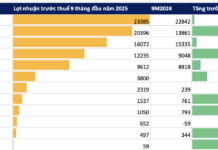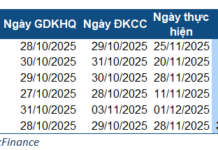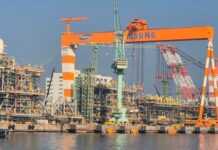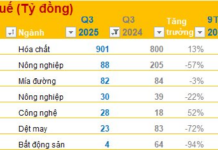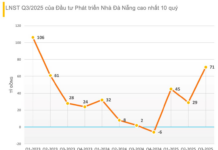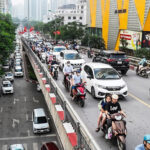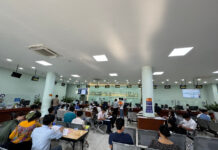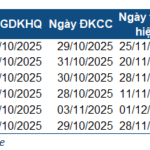The Project Management Unit No. 7 (under the Ministry of Construction) has recently submitted a report for appraisal of the pre-feasibility study report for the expansion project of the Ho Chi Minh City – Trung Luong – My Thuan Expressway. The unit is currently expediting preparations, striving to commence construction on the project, with an investment of over VND 41 trillion, by the end of 2025. The project is expected to be completed by 2028.
The main objective of the project is to address traffic congestion and complete the expressway network in the key southern economic region and the Mekong Delta. The route will be approximately 96.13 km long, starting at Cho Dem intersection (Binh Chanh district, Ho Chi Minh City) and ending at the north end of My Thuan 2 Bridge (Dong Thap province).
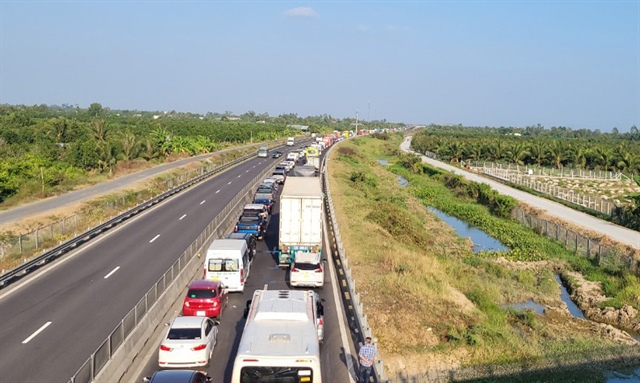 Ho Chi Minh City – Trung Luong – My Thuan Expressway frequently experiences traffic congestion due to traffic volume exceeding its capacity. Photo: NH. |
As per the plan, the Ho Chi Minh City – Trung Luong section will be expanded to 8 lanes, meeting the standards of a 120 km/h expressway. Meanwhile, the Trung Luong – My Thuan section will be widened to 6 lanes, with a designed speed of 100 km/h. The project will also involve investing in expanding rest stops along the route on a large scale, ranging from 15 to 20 hectares per side.
In terms of finance, this BOT project is calculated to have an investor’s profit rate of 11.77% per year, with an expected operation and business duration of 21 years and 3 months. The total land area required for the project is 1,045.55 hectares, including additional land acquisition of about 95.84 hectares in Ho Chi Minh City, Tay Ninh, and Dong Thap.
The project is proposed by a joint venture of Deo Ca Group, Ho Chi Minh City Technical Infrastructure Investment Joint Stock Company, Tasco, Hoang Long Construction Investment Joint Stock Company, and CII.
According to the Project Management Unit No. 7, this upgrade aims to meet the ever-increasing transportation demands, especially during holidays and Tet. The project will help reduce travel time, lower logistics costs, and enhance connectivity between the key southern economic region and the Mekong Delta, thereby promoting trade, tourism, and investment in the entire region.
On August 19, the expansion project of the Ho Chi Minh City – Long Thanh – Dau Giay Expressway, with an investment of nearly VND 15 trillion, was also inaugurated.
The scale of the project includes upgrading and expanding the main route of the expressway (from the intersection with Ho Chi Minh City’s Ring Road 2 to the intersection with Bien Hoa – Vung Tau Expressway) from 4 lanes to 8-10 lanes, and constructing a new Long Thanh Bridge with 5 lanes running parallel to the existing bridge to enhance traffic flow across the Dong Nai River. The main expressway route is expected to be completed by December 2026.
The Long Thanh Bridge will be finished by March 2027, ensuring smooth traffic flow.
The completion of the project is expected to put an end to frequent congestion, especially during holidays, on the Ho Chi Minh City – Long Thanh Expressway. It also serves as a strategic step in completing the transportation infrastructure connecting Ho Chi Minh City with Dong Nai province, particularly the Long Thanh International Airport, thereby boosting the economic development of the region.
Tuan Kiet
– 10:01 05/09/2025
The Road to Progress: Expanding the HCMC – Trung Luong – My Thuan Highway
The ambitious project to expand over 96 kilometers of the Ho Chi Minh City – Trung Luong – My Thuan expressway to 6-8 lanes, with an investment of more than VND 41,000 billion, is set to commence by the end of this year. This expansion aims to alleviate the chronic congestion at the crucial gateway connecting Ho Chi Minh City to the western provinces, offering a smoother and more efficient travel experience for commuters and boosting economic development in the region.
The Data-Driven Insight into Real Estate Around Key Infrastructure
“Location, location, location” is a well-known mantra in the real estate industry, and for good reason. But it’s not just about the present location; it’s about the future potential of that area. A property’s value is influenced not only by its physical attributes but also by its “future prospects.” This includes prime locations, convenient transportation links, well-developed infrastructure, transparent legal frameworks, and the economic growth potential of the surrounding region. These factors create a foundation for sustainable value appreciation and are key considerations for savvy investors and homeowners alike.
The Airport’s Connectivity Concerns: Expert Views on Long Thanh’s Infrastructure Challenges
The highly anticipated Long Thanh International Airport is racing against time for its grand opening in 2026. While the airport’s construction is on overdrive, concerns linger about the supporting infrastructure. Experts worry that the surrounding transportation network might not be adequately prepared to handle the influx of traffic that the new airport will bring. This raises questions about the overall accessibility and convenience for travelers, potentially casting a shadow over the airport’s debut.
The Next Property Hotspot: Unveiling the Billion-Dollar Infrastructure Revolution
The development of a multi-billion-dollar infrastructure project has transformed travel connections between Bien Hoa (Dong Nai) and Ho Chi Minh City, sparking new dynamics in the region’s real estate market.






